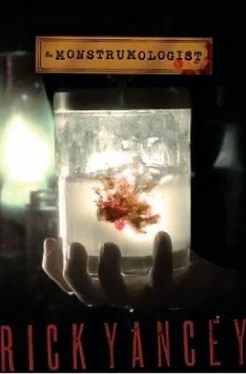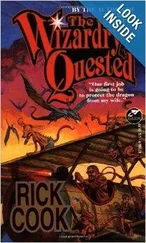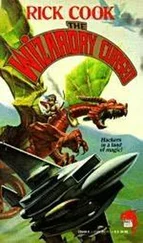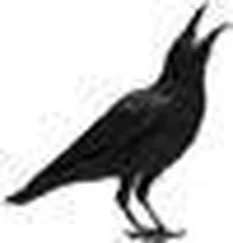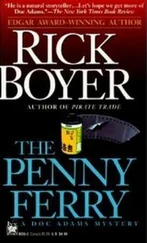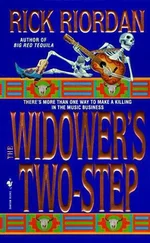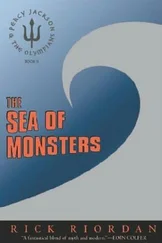Perhaps he took note of my body quivering beneath his hand, for he followed with this, his gaze becoming flinty again, “And I must say, Will Henry, it is exceedingly curious that you dwell upon the perceived folly and injustice of his end and not upon your own good fortune, the life that would have been forfeit had I not ended his. Do you see? Do you begin to understand why I said he would thank me if he could?”
“No, sir, I don’t.”
“Then I give you too much credit. I thought you were a clever boy.”
I shrugged his hand from my shoulder and cried, “I don’t understand! Forgive me, Doctor, but I don’t understand at all. We shouldn’t have gone there tonight. We should have waited till daylight to bring her back. If we had waited and fetched the constable, he might still be alive!”
“But those are not the facts,” he replied calmly. “We did not wait. We did not fetch the constable. You still fail to grasp the essentials here, Will Henry. James Henry would have. Your father would have understood-he would not have chided me or judged me. He would have thanked me.”
“Thanked you?”
“As you should thank me now, for saving your life, Will Henry.”
It was more than offensive; it was galling, given what had happened to my father as a result of his unquestioning service to the monstrumologist. He owed his demise, and I the loss of everything I held dear, to this man, and now here this same man stood demanding my gratitude!
“Had I spared him,” he went on, “you would not have been spared. I would have lost you, Will Henry, and, as I told the old man, your services are indispensable to me.”
What more need I say about this odd and solitary figure, this genius who labored all his life in obscurity in the most obscure of sciences, whom the world would little note nor long remember, but to whom the world owed much, this man who possessed, it seemed, not the slightest shred of humility or warmth, who lacked empathy and compassion and the ability to read men’s hearts-or the heart of a twelve-year-old boy whose world had been shattered in an awful instant? To bring up my father in a moment like this! What more may I offer as evidence of my hypothesis that this man’s hubris rose to heights-or sunk to depths-rarely seen outside the confines of Greek theater or the tragedies of Shakespeare? He did not equivocate with me. He did not couch his words in comforting bromides or shopworn clichés. He had saved my life because my life was important to him. He had saved my life for his sake, for the furtherance of his ambition. Thus even his mercy was rooted in his ego.
“Thank me, Will Henry,” he said softly, his tone gentle but insistent, the patient teacher to the recalcitrant pupil. “Thank me for saving your life.”
I muttered the words, looking down at my feet. Though I spoke barely above a whisper, he seemed satisfied. He patted my shoulder and whirled away, crossing the room quickly with his long stride.
“I shall not forget him!” he called over his shoulder. I thought he was speaking of my father still; he was not. “Though his motives may have been less than pure, his discovery has no doubt saved lives and perhaps brought to light an entirely new species. I shall propose to the Society that it be named in his honor: Anthropophagi americanis erasmus.”
It seemed to me a trifling recompense, but I held my tongue.
“For if my suspicions are correct, that is precisely what we’ve uncovered: a generation of Anthropophagi that has adapted brilliantly to its new environment, an environment radically different from its native Africa. New England is not the savanna, Will Henry. Ha! Far from it.”
As he spoke, he foraged among the shelves for newspapers. The monstrumologist subscribed to dozens of dailies, weeklies, and monthlies, from the New Jerusalem Gazette to the Globe , from the Times of New York and London to the smallest publication from the tiniest hamlet. Every Tuesday a large stack was dropped at our doorstep and carried (by me) into the library, where the papers were sorted (by me) alphabetically and by date of publication. Early on in my apprenticeship it had struck me as odd that for all the papers he subscribed to, I had never seen him read a single masthead. Yet he always seemed thoroughly conversant upon the events of the day, from the portentous to the paltry. He could hold forth for hours, for example, upon the vicissitudes of the stock market or the latest fashion from Paris. He must have, I decided, read them at night after I had retired to my little loft, and for a time I was convinced, based upon this and other evidence, the monstrumologist did not sleep. I had never witnessed it, even during those periods of intense melancholia, which lasted for a fortnight or longer, when he would take to his bed, inconsolable in his malaise.
In the early months of my life at Harrington Lane, sleep had eluded me. I had longed for and dreaded it, for rest I had needed but nightmares I had not, those horrible reincarnations of the night my parents perished. Many dark hours would pass before exhaustion finally overtook me, and occasionally I would creep down the ladder and peek into his room on the second floor, only to find the bed empty. To the stairs I would sneak next, peering down to the main floor, where sometimes the light from the library flooded the hall, or from the kitchen the faint clatter of pots and pans or the clink of silver upon china would rise. Most often, however, the doctor would be in his laboratory, puttering with his vials and specimen jars and drawers full of bones and dried viscera, through the dead hours of the night, until at dawn he would climb the stairs to the kitchen, rising with the sun from that pit of peculiarities and putrefaction to prepare our morning repast (or, as was more common, hastily eat what I had prepared), his smock speckled with blood and bits of tissue and other biological drippings, the nature and origin of which I cared not to speculate about.
There were other times, however, when no nocturnal inquiries were necessary. Always it seemed, well past the witching hour, just as I was finally drifting off into much-needed slumber, hard and fast would come his raps upon the ladder, or, if those failed to rouse me, he would shoot up through the opening and bang his fist against the sloping ceiling, crying in a loud voice, “Up, up, up, Will Henry! Snap to! I need you downstairs at once!” Down the stairs I would drag my weary bones, usually to the place I dreaded the most, the basement, where upon the stool I would prop my fatigued frame while he dictated a letter or the latest paper for the Monstrumologist Society, a task that, to my sleep-deprived brain, could have waited till the morrow.
Sometimes, though, he yanked me from bed for no apparent reason at all. I would sit upon the stool, yawning, while he held forth long after sunrise upon some bit of esoteric knowledge or the latest scientific breakthrough. Though puzzling at the time-and annoying, for he always managed to wake me after a long and bitter struggle with Somnus had been won-it finally occurred to me that the service I was providing was as indispensable to him as any other, perhaps more so than any other, perhaps the most vital service of all: to ease the dreadful burden of his loneliness.
Several circuits he had made between the shelves and the long table, carrying armfuls of newspaper, before I realized he might need my help. But the moment I sprang to action, he rebuked me, ordering me to fetch some stationery and a pen. He continued to scan the papers-particularly the obituary columns-and make notes as he dictated, occasionally setting both newsprint and notebook aside to make a mark upon the map. The dots he deliberately drew began to cluster together, moving generally from west to east, toward the Atlantic coast. The purpose of this plotting was obvious: The doctor was tracing a migration.
Читать дальше
